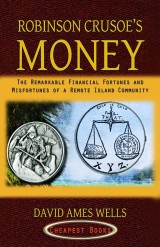Details

Robinson Crusoe's Money
"The Remarkable Financial Fortunes and Misfortunes of a Remote Island Community"|
4,99 € |
|
| Verlag: | E-Kitap Projesi & Cheapest Books |
| Format: | EPUB |
| Veröffentl.: | 23.01.2024 |
| ISBN/EAN: | 9786052259450 |
| Sprache: | englisch |
| Anzahl Seiten: | 200 |
Dieses eBook enthält ein Wasserzeichen.
Beschreibungen
An excellent example of his work in this field is his "ROBINSON CRUSOE'S MONEY", issued first in 1876 when resumption was in doubt, and again in 1896 when the 'free silver' advocacy was in full swing. Wells was among the earliest to appreciate the importance of what has since been known as 'technological unemployment,' the displacing of men by machines ..His writing and speaking was marked by simplicity, candor, and extraordinary facility in the popular adaptation of statistics. His aptness in illustration was as charming as it was effective ..."Importance of Money in De Foe's Robinson CrusoeBecasuse of Money plays an important role in De Foe's Robinson Crusoe even though the islander repeatedly celebrates his triumph over the whole attribution of value to money, a medium of no value to him, who is deprived of all human commerce. Crusoe keeps a continuous account of his wealth and he is finally overwhelmed when he has to realise how rich he became in the time of his isolation. His computations mention:§ English pounds sterling,§ Portuguese Moidors and Cruisadoes, i.e. gold moedas and silver cruzados,§ Spanish Doubloons and Pieces of Eight, i.e. gold doblóns and pesos, silver coins of eight reales,§ unspecified (gold) ducats§ unminted goldAll coins mentioned matched specific amounts of gold and silver and one knew how to calculate between these coins. Our marginal notes offer the equivalents in English money at the rates valid in 1719.The computations for 1719 are not a weak compromise. A gold Moidore minted in 1670 would not contain one gram less gold in 1719 its value as a gold coin would hence remain stable. The value of gold in silver money was, however, unstable.None of the European currencies could fix a price at which gold could be converted; and all currencies gave sums on national silver standards. The problem increased where a country failed to stabilise its silver money (by failing to issue new silver coins of the expected quality). The 1680s and 1690s thus saw the English public unwilling to continue changing their gold guineas into silver shillings at the established rate of 20 shillings the guinea. The guinea rose from 20 to 30 shillings in 1694, it was successfully fixed at 21s, 6d in 1698; the rate was modified to 21 shillings in a new attempt to stabilise the monetary system in 1717, and it was to remain at this ratio till 1816.
David Ames Wells (1828-1898), a prominent American financial economist, political activist and apostle of laissez faire, was a staunch advocate of free trade and the abolition of the tariff. "Wells wrote a large number of books, pamphlets, and articles ...
His chief interests were the tariff, the theory of money and the currency question, and taxation. His discussion of all of these took character from his inspection of American economic life, which was marked in his period by progressive lowering of costs of production through the application of science.
He, more than others, was the expositor of the nature and consequences of the 'machine age' ... Some of his most effective writing was in opposition to fiat money or depreciated monetary standards..
His chief interests were the tariff, the theory of money and the currency question, and taxation. His discussion of all of these took character from his inspection of American economic life, which was marked in his period by progressive lowering of costs of production through the application of science.
He, more than others, was the expositor of the nature and consequences of the 'machine age' ... Some of his most effective writing was in opposition to fiat money or depreciated monetary standards..

















